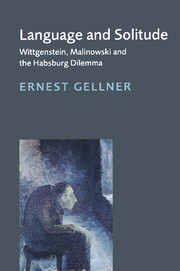Book contents
- Frontmatter
- Contents
- Preface
- Foreword
- Part I The Habsburg dilemma
- Part II Wittgenstein
- 10 The loneliness of the long-distance empiricist
- 11 The poem to solitude, or: confessions of a transcendental ego who is also a Viennese Jew
- 12 Ego and language
- 13 The world as solitary vice
- 14 The mystical
- 15 The central proposition of the Tractatus: world without culture
- 16 Wittgenstein mark 2
- 17 Tertium non datur
- 18 Joint escape
- 19 Janik and Toulmin: a critique
- 20 The case of the disappearing self
- 21 Pariah communalism
- 22 Iron cage Kafka-style
- Part III Malinowski
- Part IV Influences
- Part V Conclusions
- General bibliography
- Bibliographies of Ernest Gellner's writings on Wittgenstein, Malinowski, and nationalism
- Index
11 - The poem to solitude, or: confessions of a transcendental ego who is also a Viennese Jew
Published online by Cambridge University Press: 05 March 2010
- Frontmatter
- Contents
- Preface
- Foreword
- Part I The Habsburg dilemma
- Part II Wittgenstein
- 10 The loneliness of the long-distance empiricist
- 11 The poem to solitude, or: confessions of a transcendental ego who is also a Viennese Jew
- 12 Ego and language
- 13 The world as solitary vice
- 14 The mystical
- 15 The central proposition of the Tractatus: world without culture
- 16 Wittgenstein mark 2
- 17 Tertium non datur
- 18 Joint escape
- 19 Janik and Toulmin: a critique
- 20 The case of the disappearing self
- 21 Pariah communalism
- 22 Iron cage Kafka-style
- Part III Malinowski
- Part IV Influences
- Part V Conclusions
- General bibliography
- Bibliographies of Ernest Gellner's writings on Wittgenstein, Malinowski, and nationalism
- Index
Summary
Ludwig Wittgenstein's Tractatus Logico-Philosophicus (1922) is a poem to solitude. It is also an expression of the individualistic-universalistic, atomic vision of knowledge, thought, language and the world. That vision logically engenders solitude – though the sense of solitude may well also have had other roots. The multiple origins of this sense of solitude is what gives the story its interest.
The poem is all the more effective for its dogmatic, oracular style: the ideas are presented not as an option, which is to be argued against some possible alternative vision, or against mere doubt, as one case among others; but rather as an unquestionable, self-evident set of verities, which do not permit legitimate questioning and whose status is somehow far beyond that of mere earthly affirmation. The dogmatism is brazen. This was ever Wittgenstein's style. Contingent truths did not interest him much: he was eager to reach the very limits of conceptual choice.
There is, in effect, no sense whatever within the Tractatus of the possibility of any alternative vision: it is presented as the one and only possible vision. The key premises are abstract but seemingly cogent: the world is the summation of the facts which constitute it. This in effect is the re-statement of the basic atomic intuition: totalities are nothing but the summation of their constituent parts. This is somehow quite particularly true of the world as a whole.
- Type
- Chapter
- Information
- Language and SolitudeWittgenstein, Malinowski and the Habsburg Dilemma, pp. 46 - 58Publisher: Cambridge University PressPrint publication year: 1998



